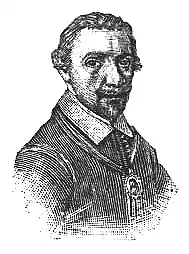
Johann Schop (ca. 1590 – 1667) was a German violinist and composer, [pronounced S-Chop], much admired as a musician and a technician, who was a virtuoso and whose compositions for the violin set impressive technical demands for that area at that time.[1] In 1756 Leopold Mozart commented on the difficulty of a trill in a work by Schop, probably composed before 1646.[2]
He worked in Hamburg. He published books of violin music in 4 to 6 parts; some of his music was performed at the Peace of Westphalia celebrations.
His melody Werde munter, mein Gemüte of 1641 was used by Johann Sebastian Bach for the chorale movements (6 and 10) of his cantata Herz und Mund und Tat und Leben, BWV 147. The sixth movement is Wohl mir, daß ich Jesum habe, and the tenth movement is Jesu bleibet meine Freude. Under the English title, Jesu, Joy of Man's Desiring, Bach's chorale has been arranged for different instruments, notably for piano by Myra Hess, and has gained wide popularity.[3]
External links
- The Mutopia Project has compositions by Johann Schop
- Free scores by Johann Schop at the International Music Score Library Project (IMSLP)
References
Footnotes
- ↑ Boyden 1990, p. 136
- ↑ Boyden 1990, p. 168
- ↑ Arnold 1983, p. 993
Notations
- Boyden, David Dodge (1990), The History of Violin Playing from Its Origins to 1761, Oxford University Press, ISBN 0-19-816183-2
- Arnold, Denis (1983), The New Oxford Companion to Music, Oxford University Press, ISBN 0-19-311316-3